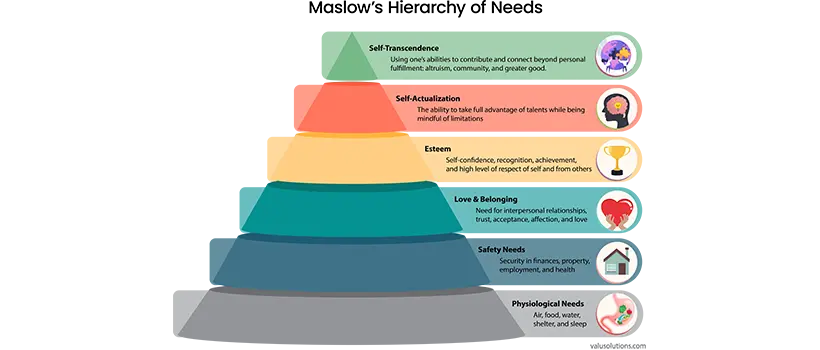The landscape of work has undergone significant transformation in recent years, with terms like “The Great Resignation,” “The Great Reconfiguration,” and “The Great Re-evaluation” dominating discussions about the workforce. These trends all point to a crucial realization: employees want to be prioritized. They seek environments where they feel valued, engaged, and indispensable. As organizations grapple with these shifts, creating a healthy workplace environment has never been more critical. This is where the CARE (Create Award Recognition Environment)® philosophy comes into play.

Why CARE Matters: Grounding Recognition in Maslow’s Hierarchy of Needs
To understand why creating an award environment is essential, we can look to Maslow’s Hierarchy of Needs. This psychological theory, developed by Abraham Maslow, proposes that human motivation is driven by the fulfillment of needs, ranging from the most basic physiological necessities to higher-level psychological aspirations.
- Physiological and Safety Needs: At the base of Maslow’s pyramid are physiological and safety needs, which correspond to an employee’s need for fair wages, a safe working environment, and job security. While these are the foundation, a healthy workplace environment must go beyond just meeting these basic needs.
- Social and Esteem Needs: As we move up the pyramid, social needs—such as belonging and connection—become paramount. Employees want to feel like they are part of a team, that they are accepted and valued. CARE (Create Award Recognition Environment)® plays a critical role here by fostering a culture of recognition that meets these social needs. By recognizing employees’ contributions, organizations not only validate their efforts but also build their self-esteem and sense of worth.
- Self-Actualization and Self-Transcendence: At the top of the hierarchy are self-actualization and self-transcendence needs. Employees aspire to realize their full potential and contribute to something greater than themselves. An effective recognition environment empowers employees to reach these higher levels by encouraging growth, acknowledging achievements, and providing opportunities for meaningful work that aligns with their personal values.
*read more on this topic here – Foster a Passion for Work blog article

Key Trends Shaping the Future of Work
To create a recognition environment that truly resonates with employees, organizations must be attuned to the trends shaping the future of work. Here are the top five trends to track:
- Hybrid Work Models: As offices reopen, many employees expect flexibility in choosing where they work. Organizations must recognize the contributions of both remote and in-office employees equally. A robust CARE (Create Award Recognition Environment)® framework ensures that all employees, regardless of location, feel valued and included in the organizational culture.
- Reinvesting in the Work Experience: With the shift from work being a physical place to a more fluid concept, companies are reinvesting in tools and technologies that enhance the work experience. This includes digital platforms that facilitate recognition and foster a sense of belonging, even in a dispersed workforce. By incorporating CARE® into these tools, organizations can ensure that recognition is a seamless part of the workday.
- Digitization of the Workforce: The pandemic has accelerated the digital transformation of many organizations. Those that embraced technology early were able to navigate the challenges of remote work more smoothly. Going forward, organizations will continue to rely on digital tools to drive engagement and recognize employee contributions. The CARE® philosophy integrates well with digital platforms, providing real-time recognition and feedback that can boost morale and performance.
- Your Employees Are Your Biggest Asset: In today’s competitive job market, organizations must prioritize their employees’ needs to retain top talent. This includes cultivating a sense of community and ensuring that employees feel valued. CARE® helps organizations build a culture of recognition where employees are consistently acknowledged for their contributions, fostering loyalty and reducing turnover.
- Greater Focus on Skills: As organizations move away from traditional education requirements, there is a greater emphasis on skills that drive competitive advantage. Recognizing and rewarding these skills through CARE® not only enhances employee satisfaction but also aligns individual contributions with organizational goals.

Implementing CARE (Create Award Recognition Environment)® to Foster a Healthy Workplace
Creating a healthy workplace environment through CARE® involves a holistic approach that touches every aspect of the employee experience. Here’s how organizations can implement this philosophy effectively:
- Holistic Integration: Recognition should be woven into the daily operations of the business. This means embedding recognition practices into team meetings, performance reviews, and even informal interactions. By making recognition a regular part of the work culture, organizations can create an environment where employees feel consistently valued.
- Data-Driven Personalization: One-size-fits-all recognition is a thing of the past. With CARE®, organizations can use data to personalize recognition efforts, ensuring that each employee receives acknowledgment in a way that is meaningful to them. Whether it’s a public shout-out, a private note, or a tangible reward, personalized recognition has a greater impact on employee engagement.
- Building Trust and Sustainability: Consistent and authentic recognition builds trust between employees and the organization. By aligning recognition efforts with the company’s core values and long-term goals, organizations can create a sustainable recognition environment that supports both individual and organizational growth.
- Leveraging Technology: Use digital platforms to facilitate real-time recognition. Tools that allow for peer-to-peer recognition, instant feedback, and gamification can make the process engaging and inclusive. These platforms should be accessible to all employees, whether they are working remotely or on-site.
- Continuous Improvement: A recognition environment is not static; it should evolve with the needs of the workforce. Regularly soliciting feedback from employees and adjusting recognition practices accordingly ensures that the CARE® philosophy remains relevant and effective.

Creating a healthy workplace environment is not just about perks and paychecks—it’s about recognizing and valuing your employees consistently and meaningfully. At Val-U Solutions®, we are committed to helping organizations implement the CARE (Create Award Recognition Environment)® philosophy to foster a culture where every employee feels appreciated and motivated to reach their full potential.
Ready to transform your workplace into a thriving environment where recognition is at the core of your culture? Contact us today to learn more about how we can help you implement CARE (Create Award Recognition Environment)® and create a healthier, more engaged workforce.
